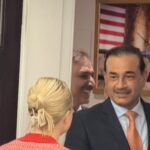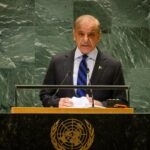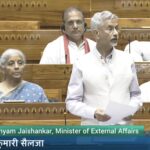Pakistan’s Prime Minister Shehbaz Sharif told the United Nations General Assembly (UNGA) that U.S. President Donald Trump’s intervention helped avert what could have been a far more destructive war in South Asia and announced Pakistan had nominated Trump for the Nobel Peace Prize.
Speaking at the 80th session of the UNGA in New York, on September 26, 2025, PM Sharif said Pakistan agreed to a ceasefire enabled by President Donald Trump’s “bold and visionary leadership.”
“We express our deep appreciation to him and his team for their active role in bringing about the ceasefire. President Trump’s efforts for peace helped avert a more threatening war in South Asia. Had it, had he not intervened timely and decisively, the consequences of a full-fledged war would have been catastrophic.”
“Who would have lived to tell what happened,” he added, and in recognition of Mr. Trump’s “wonderful and outstanding contribution to promote peace in our part of the world,” Pakistan nominated him for the Nobel Peace Prize. “And I think this is the least we could do for his love for peace. And I think truly, he is a man of peace,” the Prime Minister said.
PM Sharif used his address to thank diplomatic partners who he said supported Pakistan during the crisis, naming China, Turkey, Saudi Arabia, Qatar, Azerbaijan, Iran, the UAE and the UN secretary‑general.
Recounting the May confrontation between the two countries, the Prime Minister described Pakistan’s response to what he called “unprovoked aggression from our Eastern Front.” “The enemy came shrouded in arrogance. We sent them back in humiliation, delivering a bloody nose,” he said.
He accused India of trying to extract political advantage from the Pahalgam incident by rejecting Pakistan’s offer of an independent international investigation, and of launching attacks that targeted civilians. He framed Pakistan’s retaliation as an exercise of the right to self-defense under Article 51 of the UN Charter.
“We have won the war, and now we seek to win peace in our part of the world,” the Prime Minister said, offering a “composite, comprehensive and result oriented dialog with India on all outstanding issues.”
He called for “proactive, rather than provocative leadership” across South Asia and accused India of a “unilateral and illegal attempt” to suspend provisions of the Indus Water Treaty, saying that action violated both the treaty and international law.
On Kashmir, PM Sharif reiterated Pakistan’s long‑standing position of support for Kashmiri self‑determination, assuring the people of Kashmir. “The people of Pakistan stand with them. And one day soon, India’s tyranny in Kashmir will come to a grinding halt. Kashmir will gain. Kashmir will gain its fundamental right to self-determination through an impartial plebiscite under the auspices of this very organization, United Nations,” he added.
The Prime Minister also addressed a range of global concerns, warning that the world is “more complex today than ever before.” He cited intensifying conflicts, breaches of international law, multiplying humanitarian crises, persistent terrorism, the spread of disinformation, and the existential threat posed by climate change – a particular concern for Pakistan.
On Palestine, he described the situation as among “the most heart wrenching tragedies of our times” and condemned Israel’s actions in Gaza as an “unspeakable” terror against women and children.
Pakistan’s pitch for multilateralism, PM Sharif said, is rooted in what he described as the country’s founding foreign‑policy principles of “peace, mutual respect and cooperation,” and in its preference for resolving disputes by “dialog and diplomacy.”
India rejects Pakistan’s account
India’s Permanent Mission to the UN immediately rejected the Prime Minister’s version of events. First Secretary at the mission, Petal Gahlot, in her statement on September 26, described PM Sharif’s remarks as a “bizarre account” of the recent conflict and disputed Pakistan’s narrative of the May escalation.
“The record on this matter is clear,” she said, arguing that Pakistan had threatened further attacks until May 9 and that Pakistan’s military asked India for a cessation of hostilities only after Indian strikes on several Pakistani airbases. She suggested that public imagery of destroyed runways and damaged hangars undermines Pakistan’s claim of victory.
“The truth is that as in the past, Pakistan is responsible for a terrorist attack on innocent civilians in India. We have exercised the right to defend our people against such actions and have brought the organizers and perpetrators to justice,” Gahlot said, asserting that Pakistan must “immediately shut down all terrorist camps and handover to us terrorists wanted in India” if it is sincere about seeking peace.
She also accused Pakistan of promoting intolerance at home and reiterated India’s longstanding position that bilateral issues should be resolved without third‑party involvement. “There is no room for any third party in that regard. This is our longstanding national position,” she said, and warned that India would hold both terrorists and their sponsors accountable.
“Nor will we allow terrorism to be practiced under the cover of nuclear blackmail. India will never bow to such threats. India’s message to the world is clear; there must be zero-tolerance for terrorism,” she added.






